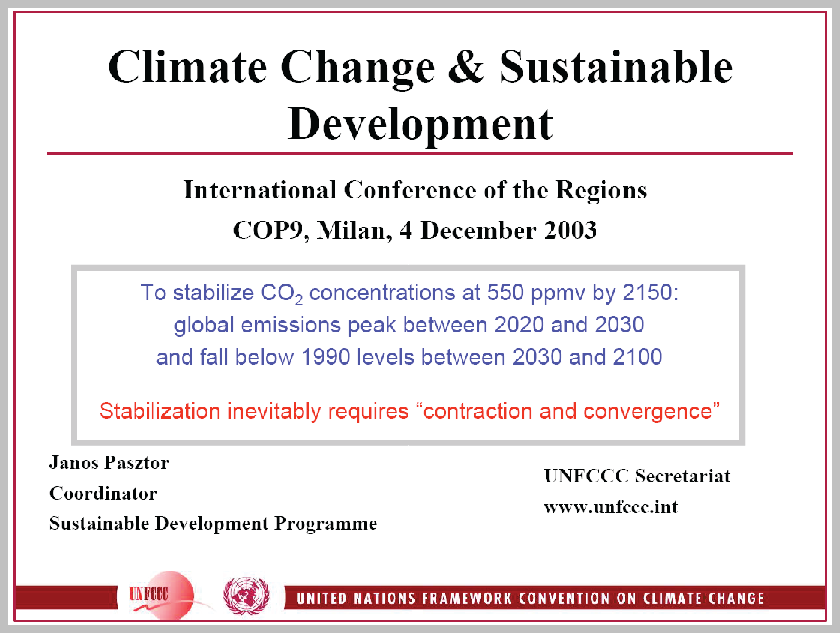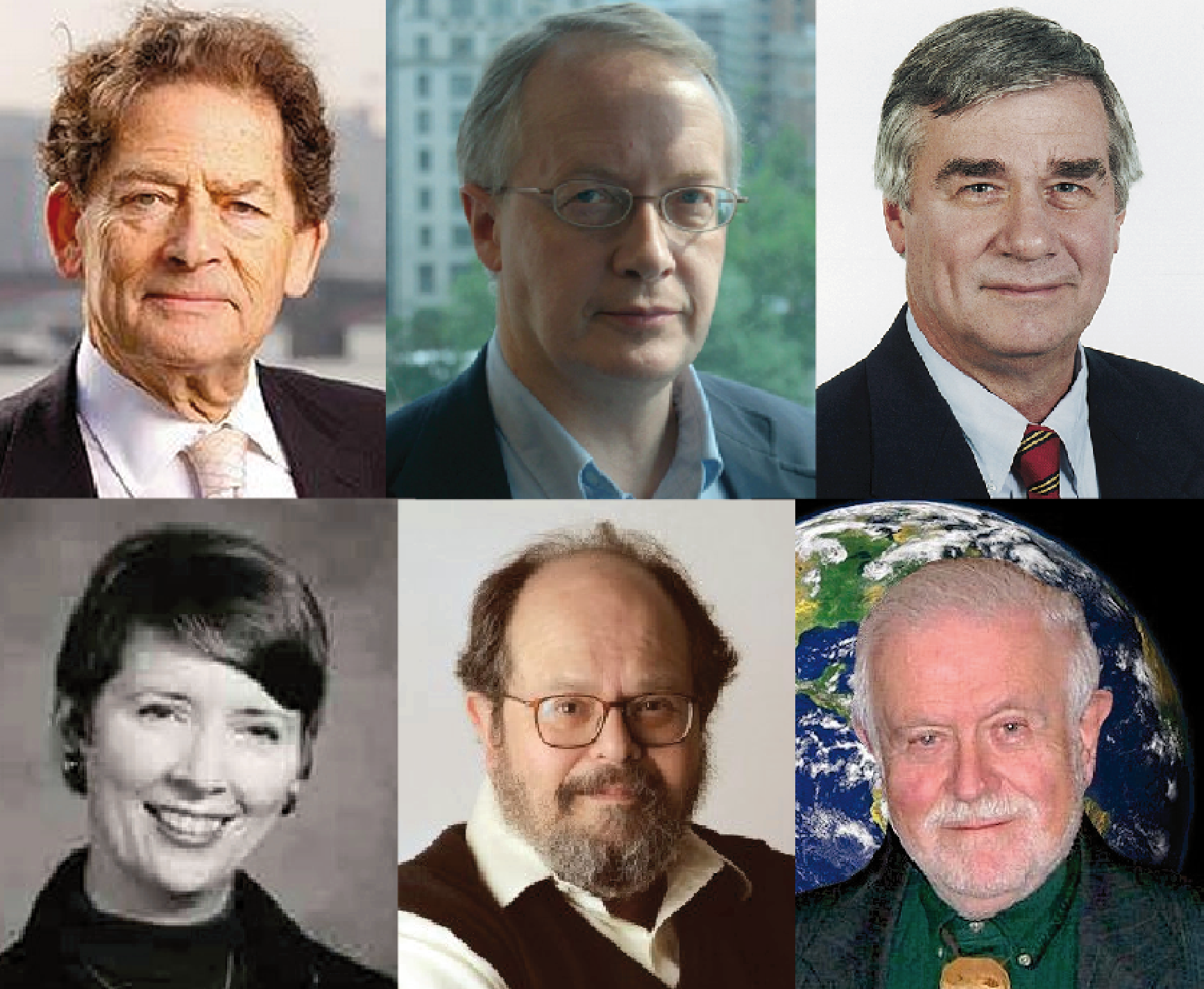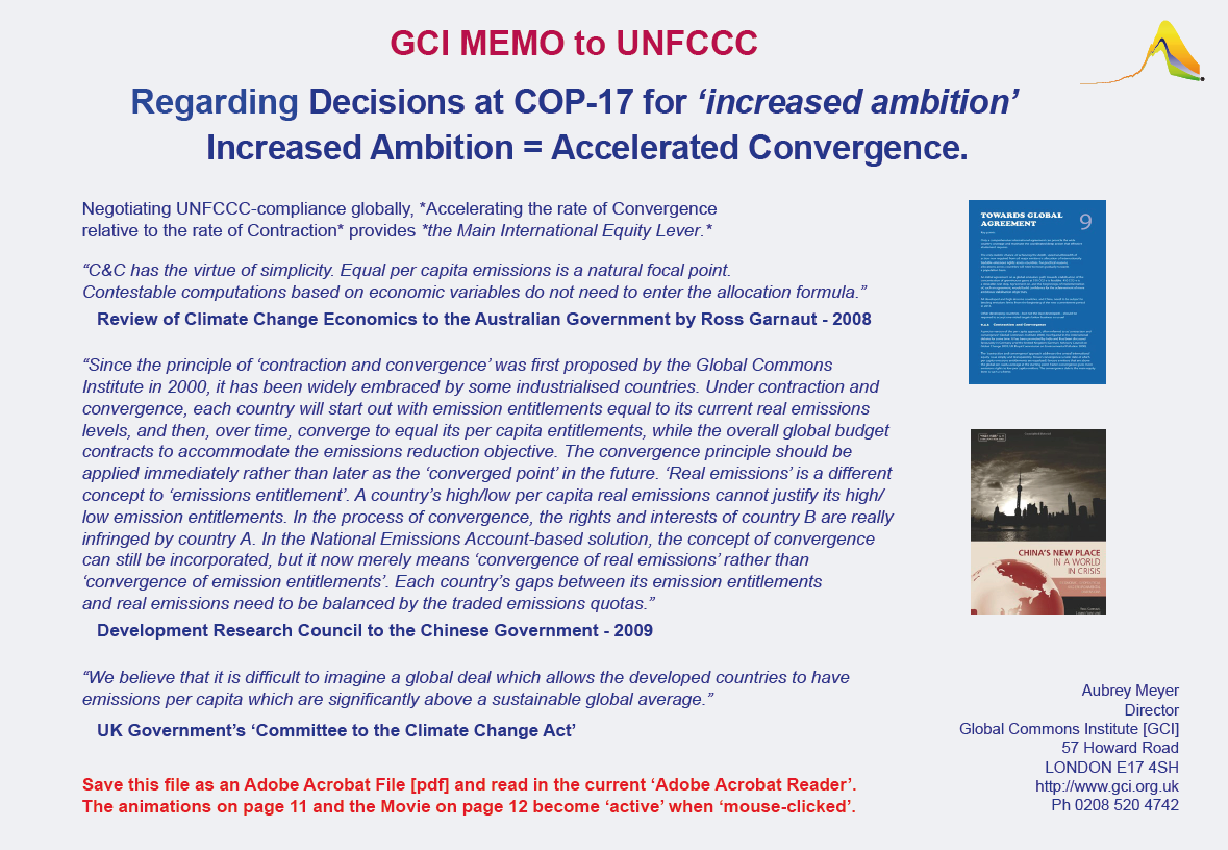Problem-Solution-Deniers
 Click logo to return to 'general links-page'
Click logo to return to 'general links-page'
UNFCCC Executive - "Stabilization inevitably requires Contraction & Convergence."
A simple truth corroborated in publications from this array of UN Agencies (and many more beyond) . . . .

Science Public Policy Institute [SPPI]
"C&C is obvious. I just don't think humanity has the wit to organise it."
Richard Lindzen MIT - making a point that may now prove to be the reality.
Who are actually worse, the PROBLEM-DENIERS or the SOLUTION-DENIERS?~~~~~~~~~~~~~~~~~~~~~~~~~~~~~~~~~~~~~~~~~~~~~~~~
The PROBLEM-DENIERS [Left to right top to bottom]
Nigel Lawson, Myron Ebell, Pat Michaels, Constance Cumbey, Richard Lindzen & Fred Singer are all 'sceptics'.
Rejecting the evidence of global-warming/climate change, they are characterised as 'problem-deniers'.
However they are not solution-deniers and are generally cordial and candid.
"C&C has a clear moral basis but doesn't deal with issues raised in my book."
Lord Lawson of Blaby
"Aubrey respects individual people and that makes him very special."
Myron Ebell CEI
"You're really good at this. Do you want to come on a roadshow round the US with me?"
Pat Michaels George Mason University
"Meyer's dedication is clear; so is his genius."
Constance Cumbey - Michagan Lawyer
"C&C is obvious. I just don't think humanity has the wit to organise it."
Richard Lindzen MIT
"A new Kyoto might be shaped by the notion of C&C."
Fred Singer SEPP Heartland.But nobody knows who Denis Ambler of SPPI actually is.
Its been suggested that Fred Singer might be Denis Ambler who recently said this: -
"The UN's Policy is Contraction and Convergence".
~~~~~~~~~~~~~~~~~~~~~~~~~~~~~~~~~~~~~~~~~~~~~~~~

The SOLUTION-DENIERS [Left to right].
Tom Burke, John Ashton & Nick Mabey of E3G amongst other, are not 'sceptics.
They all accept the evidence of global-warming/climate change.
However, they all reject C&C. As such they are all 'C&C solution-deniers' generally opinionated and rude.
"Aubrey, you're so thin-skinned. C&C is not an 'input'. It is simply the 'result' of what we do."
Tom Burke [E3G Director - Advisor to SoS Gummer in the 1990s & Rio Tinto Zinc now and Senior Advisor to the Special Representative on Climate Change at Foreign and Commonwealth Office].
Unfortunately to this day, there's no evidence to support Burke's claim. So Dick Lindzen may well be right.
"At the heart of C&C lurks an ideologically contestable assumption."
John Ashton [E3G Director - HMG Foreign Office & HM's 'Special Climate Representative'].
C&C is a rational calculus, not a 'belief system'. As such C&C has been called 'an incontestable truth'.
This is not such a surprising assumption from a man who, trained as a particle physicist, bought the American Dream/Nightmare.
"C&C is dead!"
Nick Mabey [Ex WWF and Ex Blair Cabinet Office]
Rumours of C&C's death have been vastly exaggerated. There's no evidence to support Mr Mabey's stupid comment.
It was quite possibly just a piquey reaction to this C&C tribute from Gwynne Dyer.
This gives a clue to why, according to Adair Turner said to EAC, "for reasons I don't understand the whole issue became so emotional" in Whitehall. Turner was giving evidence to EAC on the UK Climate Act on whether or not UKCA was C&C.
Problem 'deniers' argue the evidence: they say its not good enough, but say C&C has a 'moral basis'.
Solution 'deniers' accept the evidence: but say C&C is not good enough, while offering nothing else.
While the former deny the global CC problem, the latter deny the global C&C solution. Which is worse?
'Problem deniers' are now being accused by 'solution deniers' of 'crimes against humanity'.
OK - what should 'C&C solution deniers' be accused of? Stupidity?
But. . . .
"Against stupidity the very gods themselves contend in vain.
Exalted reason, Resplendent daughter of the head divine,
Wise foundress of the system of the world,
Guide of the stars, who art thou then if thou,
Bound to the tail of folly's uncurbed steed,
Must, vainly shrieking with the drunken crowd,
Eyes open, plunge down headlong in the abyss.
Accursed, who striveth after noble ends,
And with deliberate wisdom forms his plans!
To the fool-king belongs the world."
The Maid of Orleans (1801) Act III, sc. vi
Friedrich Schiller, translated by Anna Swanwick
For the record, E3G is a QUAGO [Quasi Government Organisation]
These C&C solution-deniers are funded by the Esmee Fairbairn Foundation Charity.
~~~~~~~~~~~~~~~~~~~~~~~~~~~~~~~
An event was held
at the Chatham House Tuesday 28th February 2012 and it was called: -
"An International Climate Treaty: Is it Worth Fighting for?"

The speaker was Yvo de Boer - Special Global Advisor on Climate Change and Sustainability, KPMG;
Executive Secretary, United Nations Framework Convention on Climate Change (2006-2010)
The Chair was Michael Jacobs
Visiting Professor, Grantham Research Institute on Climate Change and the Environment
~~~~~~~~~~~~~~~~~~~~~~~~~~~~~~~~~
Chatham House published the Q&A transcript to the web straight afterwards
Question from Dr Mayer Hillman after the speech:
"What concerns me most about your lecture is the fact that you didn't project, in my view, sufficiently, the gravity of the situation. You used the word 'important' on several occasions, that it was important to achieve an international climate treaty. It's not important, it's essential. You know that. Why didn't you use that word?
Beyond that, you also said in your introductory remarks that you are unaware of anything that approaches towards a global solution. You are I'm sure aware of the Global Commons Institute's framework proposal on contraction and convergence. It seems to me that that should be the point of departure on the understanding that we now know that the atmosphere has a finite capacity to absorb further burning of fossil fuels. That seems to me should be the subject on which we focus. When we then divide that by the world population, we arrive fairly logically, morally, practically at an equal share across the world population because as we contract so we converge towards equal per capita shares."
Answer from Yvo de Boer:
"Well I think for me to say in all honesty that an international legally binding treaty is essential; I would want to understand better what exactly it means. I think part of the problem at the moment is that people are using those terms very loosely. I would agree with you absolutely that we need an international agreement that measures up to the environmental challenge we are faced with. I think in terms of measuring up to that challenge, we need to be realistic.
I know about contraction and convergence; I think that the first time I asked an American negotiator what do you think of contraction and convergence - I think it must have been in 1996-7 - his reaction was well we don't contract or converge on anything else in life so why should we do it on climate change. I fully agree with you on the merits of the concept, but I think we need to be pragmatic in terms of how we can build an architecture that gets us to that concept. I think the concept in itself is very difficult to get adopted in a formal sense. Therefore, being a pragmatist, I would much more focus on the architecture that will get us to that result, rather than having a conceptual debate."
So what is wrong with de Boer's answer to Mayer Hillman?
It is a variant on classic 'solution-denial'.
[1] Firstly Yvo De Boer is clearly in a time warp. For this answer, he refers back to 1996/7 [i.e. 15 years ago and even before COP-3 Kyoto] when he was just a Dutch Bureaucrat attending UNFCCC meetings. We are presently post COP-17 2012 after several years of his failed [and occasionally tearful] 'leadership' [2006/10]. What a memory for trivia.
[2] Yvo De Boer cites this trivial piece of US gossip from 1996/7 and from an un-named US source saying, "we don't contract or converge on anything else in life so why should we do it on climate change?" So what - its irrelevant at best and delusional at worst? Why choose this example?
[a] The record shows that at COP-3 1997 Kyoto the US - in response to India China and the Africa Group - said in the negotiations,
" . . . . It does seem to us that the proposals by for example India and perhaps by others who speak to Contraction and Convegence are elements for the future, elements perhaps for a next agreement that we may ultimately all seek to engage in . . . . http://www.gci.org.uk/COP3_Transcript.pdf
[b] The UNFCCC Executive said about achieving the objective of the UNFCCC, to the record in 2004 that C&C "is inevitably required. "http://www.gci.org.uk/Documents/C&C_Janos_Pasztor_UNFCCC.pdf
[3] De Boer says he agrees with the C&C concept but, "being a pragmatist, I would much more focus on the architecture that will get us to that result, rather than having a conceptual debate."
[4] At the same time he says, "we need an international agreement that measures up to the environmental challenge we are faced with" failing to acknowledge that C&C is absolutely about *measuring UNFCCC-compliance*. He goes on to say, "I think in terms of measuring up to that challenge, we need to be realistic," which so far is anything but *measuring up to UNFCCC-compliance* and everything about making it up as you go along.
De Boer's answers here are at the very least deeply confused. What is this 'Architecture' he refers to, if not 'conceptual'? Is he thinking that just the increasingly random and rancorous row that the UNFCCC generates each year is 'the architecture'? If it is, it is precisely because people like him uncritically entertain the dangerously deluded 'arguments' like the 'US one' he cited?
De Boer's answer here is also dangerous. He says the architecture 'exists' [whatever it actually is] in that it apparently will get us to the C&C 'result'. But there is no evidence for this. Unfortunately, the record shows that year-by-year we continue to generate 'results' that are precisely the opposite of C&C - i.e. more Expansion and Divergence - and that we are more and more dangerously pointed at runaway rates of climate change as a result of this failure [C&C avoidance].
*This is classic 'solution-denial'*
This discussion has developed hereLike many people in this process, he can't distinguish between cause and effect or means & ends.
[a] we need a strategy
[b] 'implementation' is not a strategy and
[c] there is no C&C-result without a C&C-strategy
[d] there is no point in implementing anything that is not guided by and mediated by that strategy
[e] a non-C&C-result is as stupid as having done nothing at all [why plan to fail?]His argument is the equivalent of saying because I wave my arms around furiously, I play the violin like Jascha Heifitz . . . poor man - delusional . . . no wonder he was in tears when he left.
After twenty years, in 2012 [and counting] . . . . we are faced with this situation whether we like it or not.
~~~~~~~~~~~~~~~~~~~~~~~~~~
GCI MEMO to UNFCCC on *Strategy*
Regarding Decisions at COP-17 for ‘increased ambition’ equals 'accelerated convergence'. Negotiating UNFCCC-compliance globally, *Accelerating the rate of Convergence relative to the rate of Contraction* provides *the Main International Equity Lever.* “C&C has the virtue of simplicity. Equal per capita emissions is a natural focal point. Contestable computations based on economic variables do not need to enter the allocation formula.”
Review of Climate Change Economics to the Australian Government by Ross Garnaut - 2008
“Since the principle of ‘contraction and convergence’ was first proposed by the Global Commons Institute in 2000, it has been widely embraced by some industrialised countries. Under contraction and convergence, each country will start out with emission entitlements equal to its current real emissions levels, and then, over time, converge to equal its per capita entitlements, while the overall global budget contracts to accommodate the emissions reduction objective. The convergence principle should be applied immediately rather than later as the ‘converged point’ in the future.‘Real emissions’ is a different concept to ‘emissions entitlement’. A country’s high/low per capita real emissions cannot justify its high/low emission entitlements. In the process of convergence, the rights and interests of country B are really infringed by country A. In the National Emissions Account-based solution, the concept of convergence can still be incorporated, but it now merely means ‘convergence of real emissions’ rather than ‘convergence of emission entitlements’. Each country’s gaps between its emission entitlements and real emissions need to be balanced by the traded emissions quotas.”
Development Research Council to the Chinese Government - 2009
“We believe that it is difficult to imagine a global deal which allows the developed countries to have emissions per capita which are significantly above a sustainable global average.”
UK Government’s ‘Committee to the Climate Change Act’
~~~~~~~~~~~~~~~~~~~~~~


